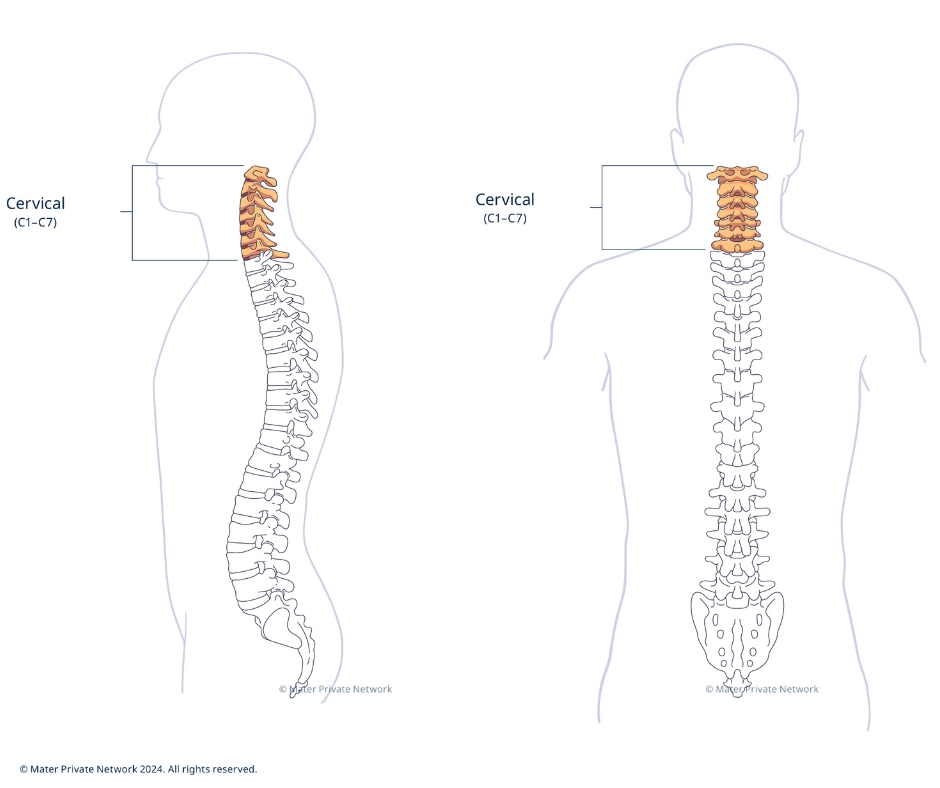Neck Pain
What is neck pain?
Neck pain is pain in or around the spine beneath your head, known as the cervical spine. Most neck pain only lasts a few weeks, but can be a symptom of many different injuries and medical conditions, so see a doctor if your pain does not go away.
There are two types of neck pain: axial which is when you mainly feel pain in your neck, and radicular which is when the pain shoots into other areas of your body, such as your shoulders or arms. The pain can be acute, lasting for days or weeks, or chronic, lasting for longer than three months.
Neck pain can reduce your quality of life if left untreated.
What are the most common symptoms of neck pain?
- Pain that's often worsened by holding your head in one place for long periods, such as when driving or working at a computer
- Muscle tightness and spasms
- Decreased ability to move your head
- Headache
What causes neck pain?
Neck pain can occur for many reasons. Some of the most common causes include:
- Muscle strain due to overuse. This is very common and examples include too much time spent hunched over your computer or smartphone, or even reading in bed.
- Worn joints due to ageing. Osteoarthritis causes the protective tissue (cartilage) between your spinal bones (vertebrae) to degrade. Your body then forms bone spurs, little jutting bones, that restrict joint motion and cause pain.
- Nerve compression caused by herniated disks or bone spurs in the vertebrae of your neck pressing on the nerves branching out from your spinal cord.
- Diseases. Certain diseases, such as rheumatoid arthritis, meningitis or cancer, can cause neck pain.
When should I see a doctor?
Most neck pain improves gradually with home treatment. If not, you should see your doctor.
Always seek immediate care if you have severe neck pain following an injury, such as a car or motorbike accident, diving accident or a fall.
Contact a doctor if your neck pain:
- Is severe
- Lasts for several days without relief
- Spreads down your arms or legs
- Comes with a headache, numbness, weakness or tingling
How can the cause of my neck pain be diagnosed?
Your doctor will take your medical history and examine you to check for sensitivity, numbness and muscle weakness. They will also check to see how far you can move your head forward, backward and side to side.
You may also require imaging tests to uncover the cause of your neck pain. These tests may include:
- X-rays which can expose parts of your neck where your nerves or spinal cord might be pinched by bone spurs or other degenerative changes.
- CT scans which combine multiple X-ray images taken from different directions which together provide detailed views of the internal structures of your neck.
- MRI which uses radio waves and a magnetic field to create detailed images of bones and soft tissues, including the spinal cord and the nerves coming from the spinal cord.
How can I relieve pain in my neck?
Over-the-counter pain medication is often enough to help alleviate neck pain. Physical exercises can also help you to correct your posture and alignment, and to strengthen your neck. Ice or heat packs may also help.
How is neck pain treated?
If your pain is severe, or chronic, you should speak to a specialist. You may require steroid injections near the nerve roots to help with the pain.










